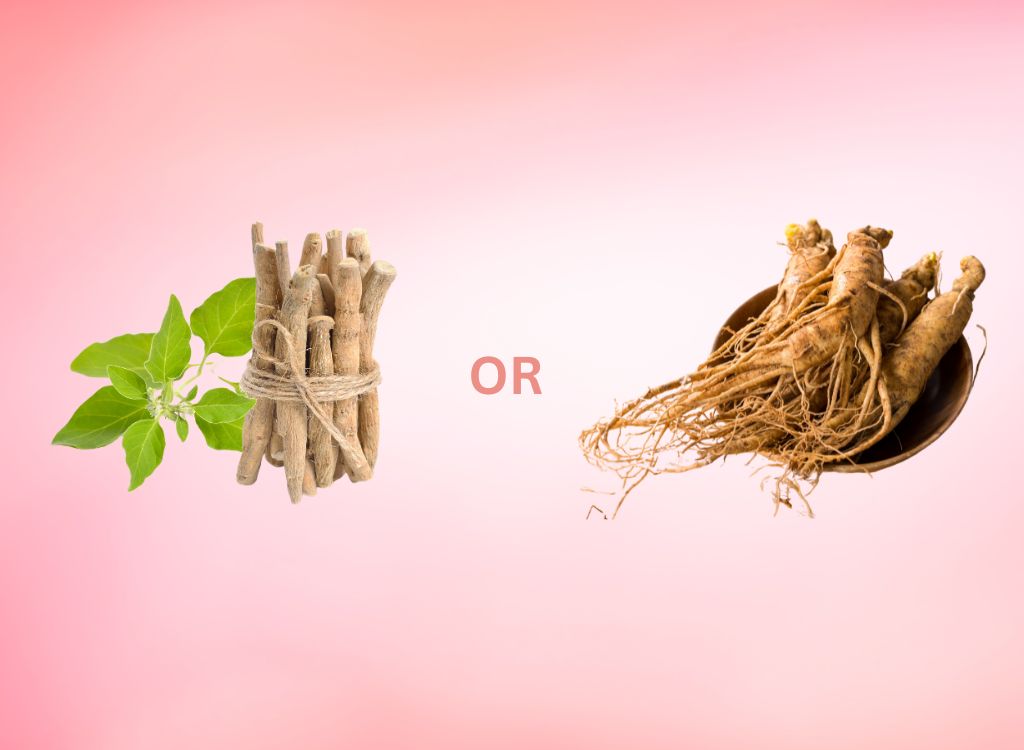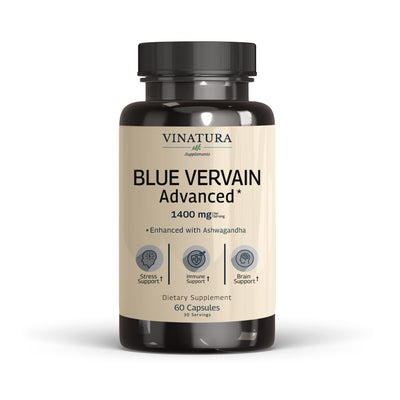
Ashwagandha Vs. Ginseng: Which Adaptogenic Herb Should You Choose?
For a long time, we have become familiar with herbs that offer incredible health benefits. Not only do they provide numerous advantages, but they are also trusted for their safety and long-standing validation.
Among these herbs, Ashwagandha and Ginseng stand out due to their impressive benefits for both mental and physical health. However, choosing between them can be challenging for everyone.
This comprehensive article will help you explore the differences between Ashwagandha and Ginseng, guiding you to determine which adaptogenic herb is best for you.
Before exploring further, please read the disclaimer located at the end of this webpage.
Key Takeaways
- Ashwagandha and Ginseng are two of the most popular adaptogenic herbs.
- They offer unique health benefits, helping to reduce stress and enhance physical strength.
- Understanding their origins, benefits, and potential side effects can help you choose the right herb.
- You can use both together for superior results, but proper guidance is essential.
What are Adaptogens?

Adaptogens are substances found in natural herbs that help the body adapt to stress and restore physiological functions. They affect the adrenal system, regulating the body's hormones in response to stress [1].
Additionally, adaptogens can enhance the body's ability to cope with physical, chemical, and biological stressors. Common adaptogens include Ashwagandha, Ginseng, Rhodiola, Holy Basil.
These herbs have been used in traditional medicine for thousands of years. They remain popular today due to their health-supporting properties and other benefits.
What are the Differences Between Ashwagandha and Ginseng?

Origin
Ashwagandha, also known as Indian Ginseng, originates from India, the Middle East, and parts of Africa. This herb has been used in treatments and spiritual practices for over 3,000 years.
On the other hand, Ginseng has various origins worldwide, notably American Ginseng and Asian Ginseng. Ginseng has long been regarded as a precious and nutritious herb with impressive benefits.
Benefits for Health
|
Ashwagandha |
Ginseng |
|
Stress reduction: Ashwagandha regulates cortisol levels in the long term. This leads to reduced stress, gradually improving emotional stability and reducing anxiety [2]. |
Immune support: Studies show that Ginseng can improve immunity, combat infections, and accelerate recovery [3]. |
|
Improved cognitive function: Ashwagandha enhances memory, concentration, and brain function. Studies suggest it may help with neurodegenerative conditions like Alzheimer’s disease [4]. |
Mood enhancement: Ginseng may improve mood and reduce depressive symptoms, though more research is needed [5]. |
|
Enhanced physical health: Ashwagandha boosts muscle strength and endurance, making it popular among athletes and fitness enthusiasts [6]. |
Antioxidant properties: Ginseng contains components that protect the body against oxidative stress by neutralizing free radicals [7]. |
The comparison table of Ashwahandha and Ginseng benefits
Safety and Side Effects
Both Ashwagandha and Ginseng are considered relatively safe for most people and do not usually cause serious side effects.
However, excessive use or improper dosing can lead to minor issues such as nausea, dizziness, and headaches. It is advisable to consult a healthcare professional before using these herbs.
Ashwagandha Vs. Ginseng: Which Adaptogens Should You Choose?
Choosing between Ashwagandha and Ginseng depends on your specific health needs and goals. Based on their listed benefits, you can determine which herb is best suited for you.
Aim to reduce stress and improve overall mental and physical health.
Ashwagandha may be a more cost-effective option. On the other hand, if you need to boost immunity, physical strength, and anti-aging benefits, Ginseng might be more beneficial.
In conclusion, both herbs offer significant health benefits. However, their effectiveness can vary depending on individual health conditions and lifestyle factors. If possible, consider using both together.
Can You Take Ashwagandha and Ginseng Together?

The answer is definitely yes! Combining Ashwagandha and Ginseng can provide synergistic benefits, complementing each other's effects.
For instance, Ashwagandha's calming properties can balance Ginseng's stimulating effects, creating a comprehensive approach to stress reduction and energy enhancement. Moreover, no research suggests that using these products together diminishes their effectiveness.
However, it is crucial to consult a healthcare professional before starting any new supplement regimen to ensure safety and avoid potential interactions.
How to Take Ashwagandha and Ginseng Together?

To use Ashwagandha and Ginseng together the most effectively:
Look for a supplement that contains both adaptogenic herbs to simplify the combination process. Such products often come in easy-to-find extract capsules.
If you cannot find a combined product, consider taking Ashwagandha in the evening to promote better sleep and Ginseng in the morning to boost energy throughout the day.
Always consult a healthcare professional to determine the safest approach for your individual needs and monitor any changes in your body to address any side effects promptly.
Conclusion
With their long history in major cultures and traditional medicine practices, Ashwagandha and Ginseng are powerful adaptogenic herbs with unique benefits.
Understanding their origins, health effects, and safety differences can help you decide which herb to incorporate into your health regimen.
Whether you choose one or use both, these adaptogens can significantly enhance your overall health and well-being. Always seek professional guidance to ensure you achieve the desired benefits safely.
References
- [1] Panossian, Alexander. "Understanding Adaptogenic Activity: Specificity of the Pharmacological Action of Adaptogens and Other Phytochemicals." Annals of the New York Academy of Sciences, vol. 1401, no. 1, June 2017, pp. 49–64. https://doi.org/10.1111/nyas.13399.
- [2] Panossian, Alexander G. "Adaptogens: Tonic Herbs for Fatigue and Stress." Alternative & Complementary Therapies, vol. 9, no. 6, Dec. 2003, pp. 327–31. https://doi.org/10.1089/107628003322658610.
- [3] Hyun, Sun Hee, et al. "Immuno-enhancement Effects of Korean Red Ginseng in Healthy Adults: A Randomized, Double-blind, Placebo-controlled Trial." Journal of Ginseng Research/Journal of Ginseng Research, vol. 45, no. 1, Jan. 2021, pp. 191–98. https://doi.org/10.1016/j.jgr.2020.08.003.
- [4] Malve, H. O. "Management of Alzheimers Disease: Role of Existing Therapies, Traditional Medicines and New Treatment Targets." Indian Journal of Pharmaceutical Sciences/Indian Journal of Pharmaceutical Sciences, vol. 79, no. 01, Jan. 2017, https://doi.org/10.4172/pharmaceutical-sciences.1000195.
- [5] Jin, Yang, et al. "Mechanisms of Panax Ginseng Action as an Antidepressant." Cell Proliferation, vol. 52, no. 6, Oct. 2019, https://doi.org/10.1111/cpr.12696.
- [6] Pérez-Gómez, Jorge, et al. "Effects of Ashwagandha (Withania Somnifera) on VO2max: A Systematic Review and Meta-Analysis." Nutrients, vol. 12, no. 4, Apr. 2020, p. 1119. https://doi.org/10.3390/nu12041119.
- [7] "The antioxidant activities of Korean Red Ginseng (Panax ginseng) and ginsenosides: A systemic review through in vivo and clinical trials." PubMed Central, Jan. 2021, https://doi.org/10.1016/j.jgr.2020.09.006
Author

Product Disclaimer
The dietary supplement products mentioned on this website are formulated based on scientific research and adhere to FDA guidelines for dietary supplements. However, the content of the articles has not been evaluated by the Food and Drug Administration (FDA) and is not intended to promote or endorse any specific product. Any products sold on this website are not intended to diagnose, treat, cure, or prevent any disease.
Opinions and Endorsements
Any claims, statements, or opinions expressed in the articles are those of the author(s) and do not necessarily reflect the views or opinions of the manufacturers of the dietary supplement products. The products sold on this website are separate from the content of the articles and are not directly endorsed or associated with the information presented here.
Liability Disclaimer
The author(s) of the articles, website, and manufacturers of the dietary supplement products do not assume any liability for any potential consequences arising from the use of the information provided in the articles. It is recommended that individuals consult with a qualified healthcare professional before making any dietary or lifestyle changes, including the use of dietary supplements.
Product Usage
Please refer to the product labels and packaging for specific usage instructions and guidelines for the dietary supplement products sold on this website.
Customer Support
For any concerns or questions regarding the dietary supplement products, please contact our customer support team, who will be more than happy to assist you.





Leave a Comment
Be the first to comment.
What do you think?